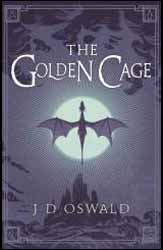|
Click here to return to the main site. Book Review
It is a time of transition. War between the north and south seems inevitable spurred on by Queen Beulah, who sends Melyn and his band of warrior priests to find a secret way into the north only remembered by the Dragon Frecknock. Further to the south Errol and Benfro have to learn to put their differences aside if both are to survive the mental onslaught of Magog and his malevolent influence... The Golden Cage (2014. 517 Pages) is the third in a series of epic fantasy books, The Ballad of Sir Benfro, from J. D. Oswald, which was proceeded by Dreamwalker and The Rose Cord. Oswald has also written a number of books in his Inspector McLean series. In this world dragons are all but extinct, having been hunted by men who knew little of them and understood less. Driven by his god, the Shepard, Melyn pursues the dragons as creatures of the wolf, which is to say innately evil. It’s a strange third book, feeling much more like the second in a series of three, whereas the first introduced the characters, the second is designed to position them for the final reckoning, but whilst there would be expectation that matters would come to a head in this novel, this does not happen, in fact very little actually happens. The story is split into three, with a minor fourth to inform the reader about happenings in the north. Beulah, intent on keeping the throne and the man she loves marries a commoner, the two then set off on a tour of the kingdom which involves a few happenings and incidences. Melyn, meanwhile, takes the young female dragon Frecknock into the forest and towards a secret passage to the north, where he can bring his queen's plans for a successful invasion to fruition. The third part of the story involves Errol, beset with visions of his beloved, held prisoner by some mighty, yet unknown dragon. When not pondering on this he helps Benfro hold off Magog’s influence. The three main stories occasionally touch each other and there is much discussion about the myths surrounding Gog and Magog and the sundering of the world. It would be fair to say the style of writing was languid, Oswald seems to have little interest in describing large and largely unemotional battle scenes, rather the book spends time with its characters and what fighting does exists does so to further the plot and not just for spectacles sake. The central partnership is between Benfro, a dragon, and Errol, a young human male. Born on the same day their paths are inextricably intertwined, Benfro is one of the last civilised dragons and Errol is a prince stolen at birth, but he does not know this. Both must survive in a hostile world using only their wits and combined magical powers. There are many elements of the book which keep you reading. This volume introduces a branch of almost wild dragons, which do not appear to know the world of men and because of their size can fly, something the civilised dragons slowly lost as they shrank in stature. There are hints that the sundering of the world might just be taken literally, which would explain what happened to Benfro’s father who disappeared looking for a way into a parallel world. The thing which will keep you going is Oswald’s wonderful prose and his gentler take on the fantasy genre; he cares enough to spend lots of time exploring his characters, all the while filling in a rich mythical background, which hopefully will pay off in the coming novels. 8 Charles Packer Buy this item online
|
|---|


